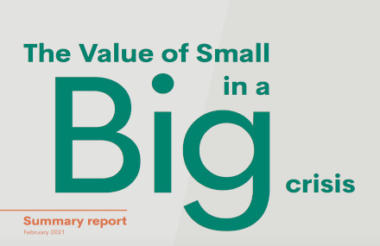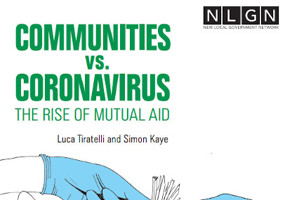Smaller charities have played a key role in supporting people and communities throughout the pandemic in a way that public services and mutual aid could not, a new report has found.
The Value of Small in a Big Crisis report finds that small charities responded effectively because they are distinctive in who they serve, how they carry out their work, and the role they play in their communities.
The report, commissioned by Lloyds Bank Foundation for England and Wales, found that small, medium and local charities, those with an income of between £10,000 and £1m, “showed up and stuck around”.
These organisations used their position of trust within communities to support people throughout the crisis, and smaller charities responded quickly and flexibly by adapting their provision in response to new and emerging needs and circumstances over time.
This is in contrast with parts of the public sector, which were slower to react early on, and informal support and mutual aid, which dissipated over time.
Based on interviews with charities and the public sector in four areas across England and Wales, the researchers found that smaller charities addressed four main areas of need: access to food; isolation and loneliness; information; and mental health. They also did so in ways that were tailored to different groups experiencing complex social issues.
'Without our services the lives of some of our community members would have been at risk'
One charity involved in the research was Golden Opportunity Skills and Development (GOS&D), a small BAME-led charity which work with disadvantaged children and young people in West London.
Sharmake Diriye, programme lead at GOS&D, said: “At the start of the pandemic, we mobilised to tackle misinformation about the virus that was partially driven by public health messages that weren’t reaching our community. Many were also going without food while others could not access medication.”
He added: “Without our services, the lives of some of our community members would have been at risk. Over 100 users and their families would have found themselves sleeping rough and, on the streets, if GOS&D had not intervened. We also used our longstanding relationships with the local council and NHS services to ensure that those with mental ill health were referred to relevant services.”
Despite the response of smaller charities to the pandemic described in the report and the benefits and value this has brought, they face significant challenges due to Covid-19. They have seen an increase in the level and severity of need, reductions, unpredictability, and volatility in funding, and concerns about staff wellbeing.
Government must recognise the value of small charities
The report calls for national and local government to recognise the value of small charities so they can continue to support individuals and communities.
It asks government to help to rebuild by providing long-term, flexible, core funding for smaller charities and enhancing digital inclusion and service delivery.
Paul Streets, chief executive of Lloyds Bank Foundation for England and Wales, said: “Small charities’ knowledge of local communities is unparalleled, and has allowed them to provide effective services to those who’ve needed them the most during this most challenging of times.”
He added: “If government really wants to help people through Covid-19 and beyond it should invest more in small frontline charities - who are already on the ground in their communities and achieve fantastic results - and less in big top-down private contracts. We call on government, councils, and other funders to act on the report’s recommendations to ensure small charities can be there to help the county and communities recover and rebuild.”
The report states that a thriving and resilient population of smaller charities should be an explicit goal of public policy at a national and local level, as their transformative capacity is currently constrained by the policy environments in which they currently operate.
Related articles












